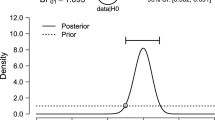Conclusion
The concepts of supportive evidence and of relevant evidence seem very closely related to each other. Supportive evidence is clearly always relevant as well. But must relevant evidence be defined as evidence which is either supportive or weakeking? In an explicit or implicit manner, this is indeed the position of many philosophers. The paradox of ideal evidence, however, shows us that this is to restrictive. Besides increasing or decreasing the probability attached to some hypothesis, evidence can alter or interact with the background assumptions underlying the hypothesis.
In most circumstances, the (post hoc) relevance of evidence can indeed be judged by its effect on the confidence one attaches to hypotheses. Occasionally, as in the circumstances described by Example I, and more generally called “the Paradox of Ideal Evidence”, the relevance of evidence to an hypothesis can only be understood by appeal to a broader sense.
Similar content being viewed by others
References
Achinstein, P.: 1978, ‘Concepts of evidence’, Mind 86, 22–45.
Bar-Hillel, M. and Margalit, A.: 1979, ‘In defense of the classical concept of evidence’, Mind 88, 576–583.
DeFinetti, B.: 1937, ‘Foresight: Its logical laws, its subjective sources’, Annales de l'Institut Henri Poincaré 7. Also appears in H. E. Kyburg, Jr. and H. E. Smokler (eds.), Studies in Subjective Probability, New York: Wiley, 1964.
Ellsberg, D.: 1961, ‘Risk, ambiguity, and the Savage axioms’, Quarterly JOurnal of Economics 75, 643–669.
Kahneman, D. and Tversky, A.: 1979, ‘Prospect Theory: An analysis of decision under risk’, Econometrica 47 263–291.
Lindley, D. V. and Phillips, L. D.: 1976, ‘Interference for a Bernoulli process (a Bayesian view)’, The American Statistician 30, 112–119.
Peirce, C. S.: 21932, Collected Papers, p. 421 (first edition, 1878).
Popper, K.: 1959, The Logic of Scientific Inquiry, London: Hutchinson.
Skyrms, B.: in press, ‘Higher order degrees of belief’, in D. H. Mellor (ed.), Prospects for Pragmatism—Essays in Honor of F. P. Ramsey.
Author information
Authors and Affiliations
Additional information
In Memory of My Father. Yehoshua Bar-Hillel
The author wishes to thank Haim Gaifman for a most thoughtful and constructive review of an earlier draft of this paper.
Rights and permissions
About this article
Cite this article
Bar-Hillel, M. Ideal evidence, relevance and second-order probabilities. Erkenntnis 17, 273–290 (1982). https://doi.org/10.1007/BF00182670
Received:
Accepted:
Issue Date:
DOI: https://doi.org/10.1007/BF00182670




